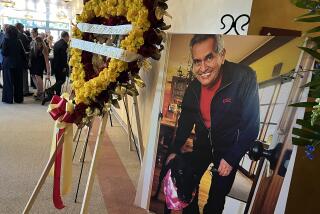Alarcon Honored for His Support of Human Rights
- Share via
SHERMAN OAKS — The Rev. W.J. Bellamy was just another face in the crowd when Nelson Mandela visited Los Angeles in 1990.
The Panorama City pastor was among hundreds of volunteers organizing the South African leader’s visit to the city to raise support for dismantling apartheid in his country.
Bellamy, who served as one of the drivers taking the visiting South Africans to events across Los Angeles, was able to get close enough to Mandela to pose a simple yet profound question.
“What can I do to keep your dream alive?” Bellamy asked.
“Keep telling the story,” Mandela answered.
With that advice in mind, Bellamy began collecting photographs, writings and other memorabilia to document the fight against apartheid. The items are now part of the exhibit “Amandla Awathu/Power to the People: African American and African Solidarity.”
On Sunday, Bellamy’s organization, Colour Me Freedom Foundation and Museum, presented its 1999 Diversity Award to state Sen. Richard Alarcon (D-Sylmar) during a luncheon at the Radisson Valley Center Hotel in Sherman Oaks.
The former Los Angeles city councilman was an early supporter of the organization and was instrumental in securing funding for the group to get its exhibit to Washington, D.C., Bellamy said.
“When Rev. Bellamy first approached me with his idea for a foundation and a museum, I asked, ‘Why Nelson Mandela? Would the people in the San Fernando Valley embrace his message against apartheid?,’ ” Alarcon said.
“We need the message in the San Fernando Valley,” Alarcon said. “We need to rise above our bigotries, our tendencies toward violence and our gender biases. . . . The message carried by Mandela needs to be heard in every area of the world.”
The traveling exhibit has been displayed at the California African-American Museum in Los Angeles and in the U.S. Capitol. Last month, the display was on view at the Palais des Nations in Geneva to commemorate the United Nations’ International Day Against Racism.
Through the display, Bellamy seeks to improve understanding between Africans and African Americans.
“People used to think that Africans didn’t want to have anything to do with African Americans and that African Americans didn’t care about Africans, but that’s not true,” said Bellamy, who is the founding pastor of All Peoples AME Church in Panorama City.
“We want people to see that South Africans are real folks,” he said. “They have the same fears and concerns as people in this country.”
The exhibit is the centerpiece of the Colour Me Freedom Foundation and Museum, a nonprofit organization that provides educational programs for African Americans and resettlement assistance for Africans relocating to America, Bellamy said.
*
Through its proposed museum, he said, the agency hopes to document the struggle for human rights among a wide variety of ethnic groups. The facility is to be built on donated land in Oxford, Miss., a location chosen because of its connection to the civil rights movement.
At Sunday’s ceremony, Bellamy said the Diversity Award is given to individuals for their contributions to human rights. Past recipients have included Mandela, U.S. Rep. Maxine Waters (D-Los Angeles), Los Angeles Urban League President John Mack and entertainer Stevie Wonder.
In his keynote address, state Sen. Richard Polanco (D-Los Angeles) said the award “is about the issue of diversity, about having a seat at the table and about deciding the outcomes as we sit at the table together.”
Polanco said Alarcon deserved the award because he “has effectively reached out to build bridges.”
“He is a man who looks past color and sees promise, and looks past ethnicity and sees culture,” Polanco said. “Richard Alarcon celebrates those things that make us unique and challenges us to come together with a common purpose.”
Bellamy said Alarcon and Polanco were both invited to the affair because he needs their support to establish the museum.
“We want to tell the story of the common, ordinary, real people involved in the struggle for human rights everywhere,” Bellamy said. “The whole process is about healing and telling a story so that people will not forget.”
More to Read
Sign up for Essential California
The most important California stories and recommendations in your inbox every morning.
You may occasionally receive promotional content from the Los Angeles Times.













